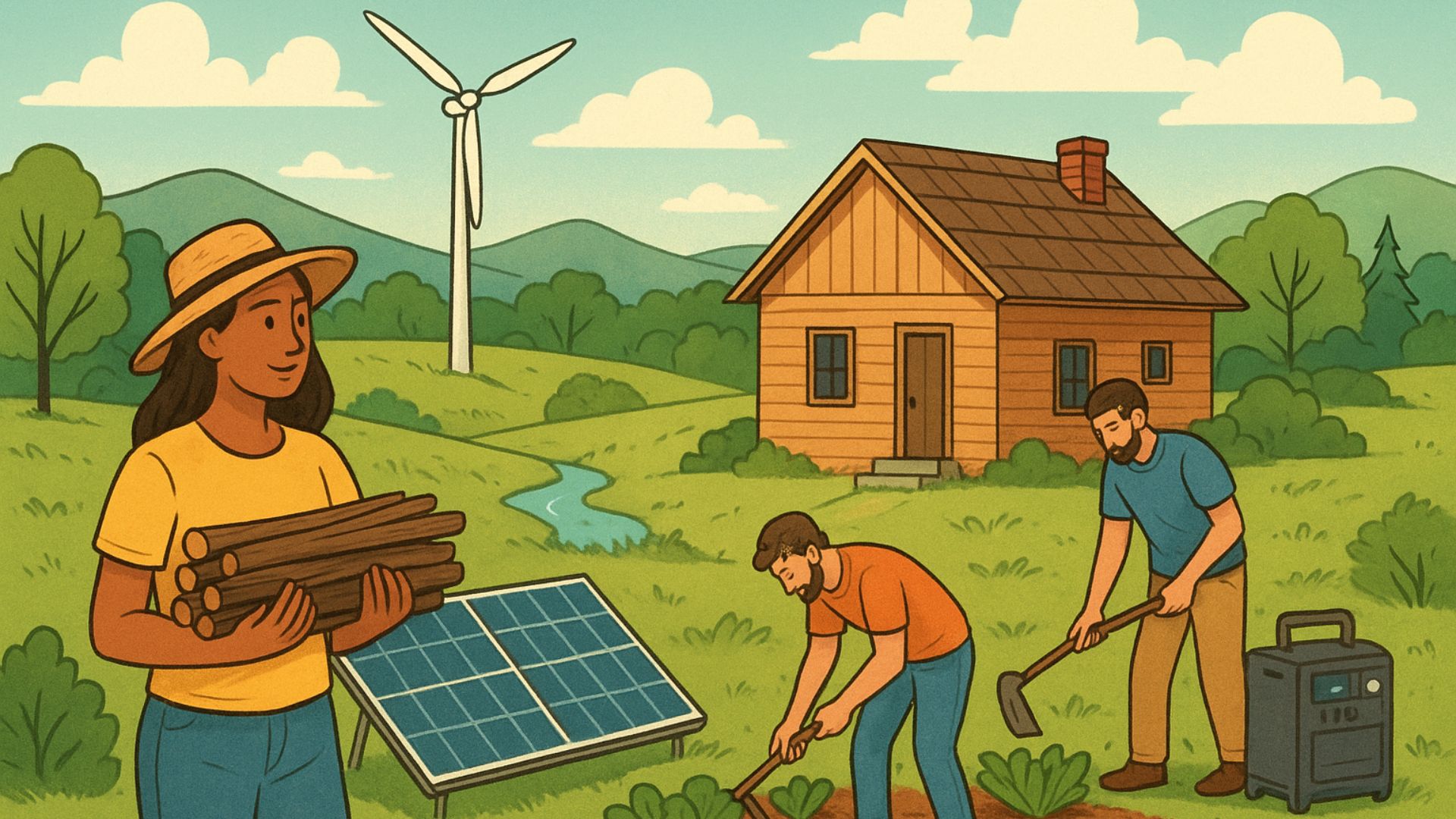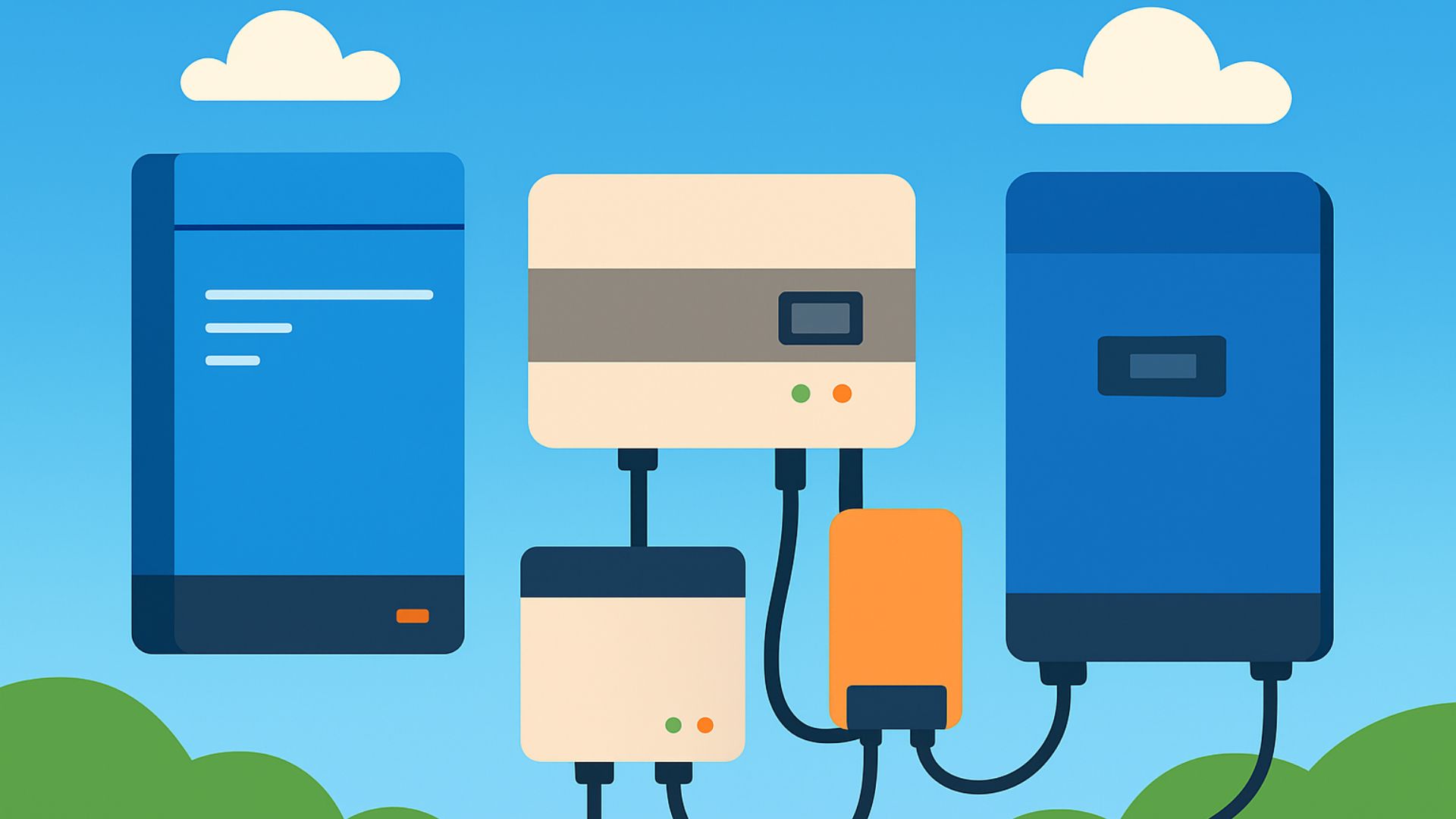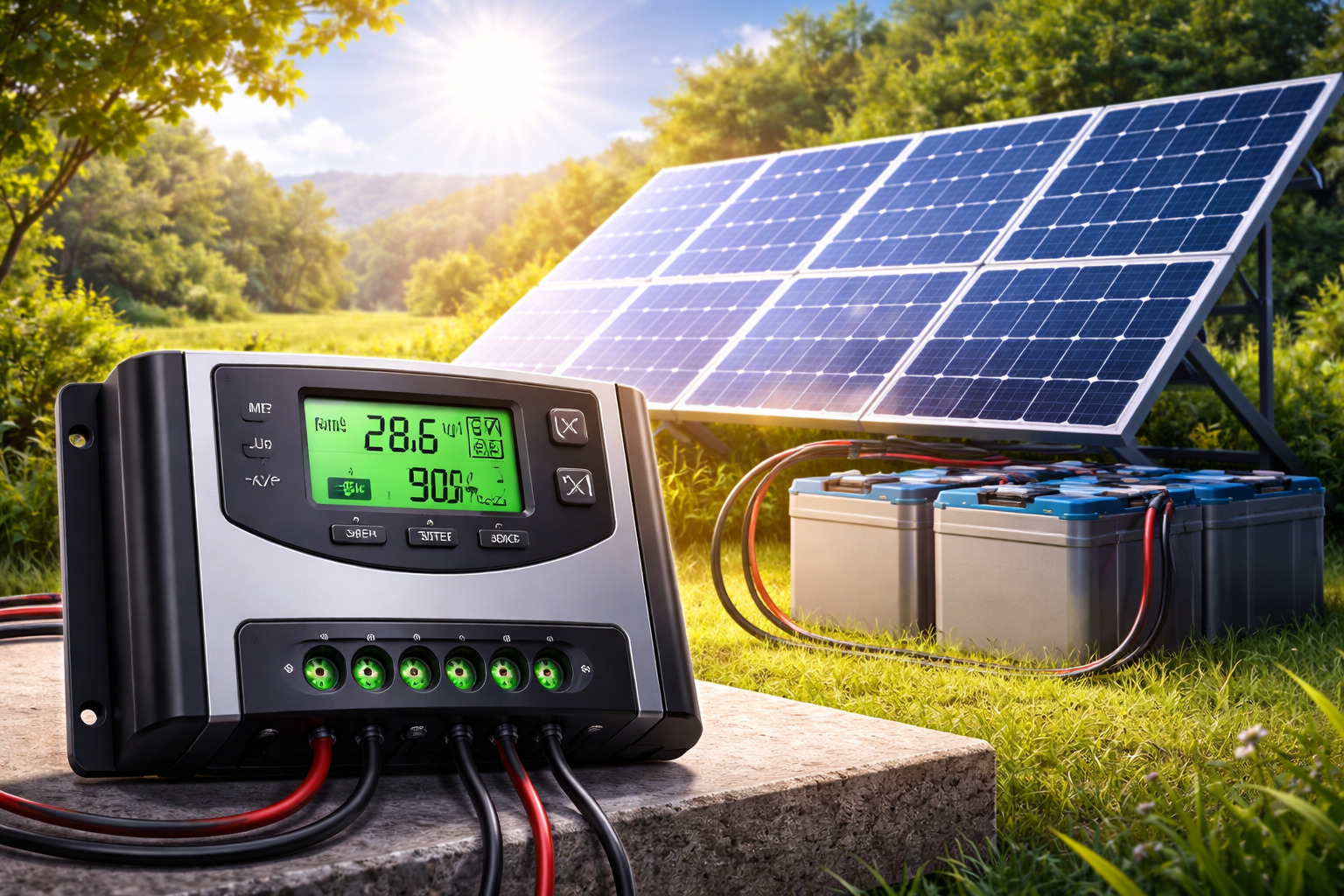Table of Contents
- Introduction 📜
- 1. Off-grid, Grid-independent: What Does It All Mean?
- 2. Why Do People Want To Be Off The Grid?
- 3. Requirements For Living Off The Grid
- 4. Living Off the Grid: Insights from a Life Since 1986
- 5. Off-grid Living Challenges
- Closing Thoughts 💭
- Frequently Asked Questions ❓
- Sources and Further Reading 💡
Introduction 📜
Off-grid living demands a blend of extreme skills, enduring stamina, and a readiness to adopt a lifestyle distinct from conventional materialism. It involves evaluating crucial aspects like shelter, water, electricity, cooking, and bathroom facilities. Shelter options vary from tents to houses with different costs. Water sources range from stream water filters to well digging. Electricity can be generated through solar generators or full solar arrays, based on preferences and budget. Cooking methods may include camp stoves, wood stoves, or propane setups. Bathroom choices span from composting toilets to full plumbing, septic, and well systems.

Somewhere in Alaska
Transitioning to an off-grid life necessitates thorough research, planning, and, in some cases, a secluded environment supporting self-sustainability. While its popularity has increased recently, off-grid living requires careful consideration and a deep commitment to a simplified, sustainable lifestyle.
1. Off-grid, Grid-independent: What Does It All Mean?
Describing an energy system powered by renewable or alternative sources that operates autonomously without relying on the main electrical grid; for instance, an independent photovoltaic array. In a broader sense, it refers to any electrical power project or source functioning without connection to a utility distribution system, emphasizing grid independence.
2. Why Do People Want To Be Off The Grid?
Choosing an off-grid lifestyle stems from a desire to forge a deeper connection with nature, taking charge of essential resources like power, water, and food production. This intentional way of living not only fosters personal independence but also contributes to a reduced ecological footprint.

Off grid living offers opportunity to be carbon positive (Image: YourHome.gov.au)
Transitioning from conventional living to an off-grid existence is undoubtedly a formidable challenge, yet the allure lies in the unparalleled freedom it affords. The decision to disconnect from mainstream amenities is an inspiring choice, driven by the aspiration to minimize environmental impact and embrace a life intimately intertwined with the natural world.
3. Requirements For Living Off The Grid
3.1 Land

Finding a place to enable off-grid living can be tricky
Securing a suitable living space is a pivotal aspect of off-grid living, and it involves careful consideration of various factors. Firstly, one must explore remote lands that are conducive to an off-grid lifestyle, taking into account aspects such as water access, climate, soil quality, sun exposure, and legal requirements. Additionally, it’s crucial to strike a balance by selecting a location that offers isolation while still being in proximity to essential town services—unless, of course, one embraces the extreme isolation akin to the story of Chris McCandless (at your own risk and peril!). This careful balance ensures a sustainable off-grid lifestyle without compromising necessary connections to societal services.
3.2 Shelter
- Select a suitable off-grid dwelling, such as cabins, tiny houses, or modern homes with consideration for local regulations.
- Plan for the type of shelter early, as some areas may have restrictions on alternative housing options.
3.3 Water And Water Collection System
- Ensure access to clean water or plan for convenient water hauling or well digging.
- Implement a water collection system, from rain barrels to more complex cistern setups.

Hand Drawn Earthship Off Grid Living Model
3.4 Food
- Establish a self-sustaining food source through gardens, raised beds, greenhouses, and potentially livestock.
- Learn food preservation techniques to stock up for winter and emergencies.
3.5 Power Generation System
Ensure a consistent power supply off the grid by investing in a reliable energy generation system like solar and wind, tailored to meet the energy requirements of your appliances. Additionally, for times of low sun or wind, having a backup generator is essential to maintain a steady power source.
Find out the easiest way to go about it in the video below!
3.6 Power Storage System
- Install a battery storage system to store excess energy for nighttime use.
- Recognize the expense but consider it a worthwhile investment for uninterrupted power.
3.7 Heating and Cooling
- Customize heating and cooling solutions based on climate, using wood stoves, solar-powered fans, or air conditioning units.
- Implement passive heating and cooling techniques through shading, insulation, and optimal window placement.
3.8 Waste Disposal And Septic System
- Adhere to local waste disposal guidelines, considering composting toilets or traditional septic systems.
- Manage kitchen waste and trash responsibly to minimize environmental impact.
3.9 Communication and Security
- Establish reliable communication systems like satellite phones or landlines, especially in areas with poor cell service.
- Prioritize security with measures like cameras, motion sensors, and potentially a guard dog.
3.10 The Mindset And Will to Live Off The Grid
- Embrace the mindset required for off-grid living, acknowledging the commitment, hard work, and responsibility involved.
- Understand the initial investment and ongoing effort, recognizing the potential rewards of freedom, independence, and sustainability.
3.11 Additional Insights
- Recognize off-grid living as a means to reconnect with nature, reduce environmental impact, and achieve a sustainable lifestyle.
- Consider reliable off-grid power solutions, such as Jackery Solar Generators, for efficient solar systems.
- Evaluate the types of off-grid living (Extreme, Partial, Modern) and their respective advantages and challenges.
- Prioritize the essentials of off-grid living: shelter, power, water, and food, considering factors like accessibility and sustainability.
Embarking on an off-grid lifestyle requires meticulous planning, resourcefulness, and a strong commitment to a self-sufficient and sustainable way of life.
4. Living Off the Grid: Insights from a Life Since 1986 ⭐
While living off the grid has gained popularity in recent years, during my research, I discovered individuals who have been practicing this lifestyle since the 80s. This is not surprising as it coincides with the start of the ecological movement. However, it is extremely enriching to gain insights into the advantages and challenges they have perceived throughout the years.
4.1 As Much A Social Statement As A Sustainable One?
In a fascinating Reddit AMA session, an individual shared their experience of living off the grid in the mountains of southern Oregon since 1986. For them, living off the grid entails breaking free from traditional utility structures, including municipal electricity, water, gas, and sewer systems. They reside beyond the reach of mail, road maintenance, and emergency services. Notably, their only connection to the grid is through wireless internet, with an antenna receiving the signal, emphasizing a distinct departure from wire or fiber optic connections. This unique lifestyle, despite having a cell phone with no cellular signal at home, showcases the challenges and rewards of a truly off-grid existence.

Somewhere in Oregon
Participants in the AMA posed a range of questions, delving into aspects like water sources, food sustainability, and community dynamics. The responder highlighted how their community tapped into a mountain spring, featuring a shared water grid among a handful of neighbors. While they didn't hunt, they raised chickens for eggs and rabbits for meat, though the latter practice was eventually discontinued due to its challenges. Engaging in community life, the participant shed light on the communal aspects of off-grid living, recounting how they were raised in this environment by their parents.
Questions also touched on the formation of off-grid communities, socialization beyond community borders, and the participant's self-sufficiency goals. Their responses underscored the unique challenges and rewards of communal living, emphasizing the importance of finding like-minded individuals when establishing such communities.
The participant discussed their internet setup, utilizing an antenna for wireless internet, and their reliance on streaming services for entertainment. They shared insights into waste management, detailing the transition from an outhouse to a composting toilet system. Addressing potential disruptions in supply chains, they mentioned maintaining a community hobby garden and considering stockpiling PVC supplies as a contingency.
In providing advice for those aspiring to live off the grid, the participant recommended gradually acquiring tools and equipment, emphasizing the importance of a year-round water source. The AMA offered a glimpse into a unique lifestyle, showcasing the complexities, rewards, and the continual need for adaptation in the pursuit of an off-grid existence.
5. Off Grid Living: Challenges ⚠️
It remains important to recognize and prepare for the inherent challenges that come with an off-grid lifestyle.
5.1 Initial Investment
Although the guide emphasizes the potential to live off the grid with no money, it acknowledges that some initial investment may be necessary, such as securing land, basic construction materials, tools, and seeds.
5.2 Skill Acquisition
The article mentions the importance of learning essential skills like gardening, carpentry, and cooking. However, acquiring these skills requires time, effort, and dedication, especially for individuals new to off-grid living.
5.3 Ressource Managemen
Off-grid living necessitates effective resource management, including water collection, energy generation, and sustainable farming. Balancing these aspects requires careful planning and continuous effort.
5.4 Isolation and Community Dynamics
Living off the grid often means being in remote locations or small communities. This isolation can pose challenges in terms of access to services, medical facilities, and social interactions. Additionally, community dynamics can be complex, requiring individuals to navigate interpersonal relationships.
The video below covers everything you need to know about the challenges of living remote and off grid:
5.5 Sustainability Challenge
Achieving true sustainability involves continuous effort and adaptation. Factors like weather conditions, soil quality, and the availability of natural resources can pose challenges to maintaining a self-sufficient lifestyle.
Closing Thoughts 💭
While off-grid living stands as a powerful testament to independence and sustainability, it is, without a doubt, a challenging way of life. Achieving true self-sufficiency, finding the right location, and preparing for the long-term commitment that off-grid living demands all require careful planning and dedication. Often romanticized, the reality of living off the grid is far more complex. While it undeniably offers the benefits of a more sustainable lifestyle, it's crucial to maintain a clear-eyed perspective on both the rewards and challenges, avoiding the temptation to embellish its allure.
You May Also Like 👇
Off Grid Homes: Unlocking the Secrets to Sustainable, Self-Sufficient Living
Living Off The Grid For Beginners: Some Things To Consider
Best States For Off The Grid Living In The US
Comprehensive Guide to Energy Saving Devices: Reducing Your Electricity Bills and Carbon Footprint
Essential Sustainable Household Products: Your Must-Haves
Energy Saving Devices for Home: Enhancing Efficiency and Cutting Costs
Biodegradable Trash Bags: Useful or Marketing Ploy?
FAQs❓
1. What Is The Point Of Living Off The Grid?
+Living off the grid offers a unique sense of independence and self-sufficiency. It allows individuals to control their own energy, water, and food supply, promoting a simpler, often more intentional lifestyle. Off-grid living often provides a closer connection to nature and reduces reliance on public utilities. According to various lifestyle blogs, it encourages a more sustainable way of life, particularly when powered by renewable energy sources.
2. Is Living Off The Grid Good For The Environment?
+Living off the grid can be beneficial for the environment by reducing overall energy consumption and carbon footprint. Many off-grid households rely on renewable resources like solar or wind energy, which help decrease fossil fuel usage. Additionally, practices like greywater recycling and organic gardening contribute to resource conservation. However, environmental benefits depend on the methods used, as improper waste management or excessive land use can have negative impacts. Sources such as Mother Earth News and Treehugger provide further insights into sustainable off-grid practices.
3. What Is The Disadvantage Of Off-Grid?
+
The main disadvantages of off-grid systems include higher initial costs due to the need for batteries to ensure consistent electricity supply day and night.
Lifestyle adjustments may be necessary to reduce energy consumption. During bad weather or system servicing, reliance on grid power is not an option.
Additionally, powering an entire home off-grid requires more panels and large-capacity batteries, leading to higher initial costs.
While off-grid living offers benefits like reduced environmental footprint and independence, it comes with these drawbacks, including potential limitations and expenses associated with battery storage.
4. Is Going Off The Grid Worth It?
+
Going off the grid can be worth it for those seeking self-reliance and a simpler lifestyle. It can lower utility bills and reduce one’s environmental impact, especially if relying on renewable energy sources.
However, the initial investment and potential lifestyle changes required may not suit everyone. According to off-grid living guides, those who value sustainability and independence may find the trade-offs worth it, while others might prefer the convenience of grid services.
5. What Do You Need For Off Grid Living?
+
Off-grid living entails securing land with essential resources, constructing a sustainable home, and implementing key systems for self-sufficiency.
This involves installing solar panels for renewable electricity, having a backup power supply for cloudy days, drilling a well for water access, and installing a septic tank and greywater system for waste disposal and water reuse.
Additionally, cultivating skills in growing and preserving food is crucial for maintaining food self-sufficiency.
The overall goal is to rely on renewable energy sources and conservation practices to achieve a sustainable, off-grid lifestyle.
6. How Do You Actually Live Off The Grid?
+
Living off the grid involves generating your own power through solar panels or other renewable sources, securing an independent water supply like a well, and managing waste disposal through systems like septic tanks.
Many off-gridders grow and preserve their own food, limit water usage, and adopt energy-saving practices to maintain self-sufficiency. Blogs such as The Homestead Guide provide insights on daily strategies for successful off-grid living.
7. How Does Off The Grid Work?
+
Off-grid systems work by creating a closed-loop for essential resources. Energy is generated on-site, typically from solar or wind sources, and stored in batteries for use around the clock.
Water is usually sourced from a well or rainwater collection system, while waste is managed through composting toilets or septic tanks. By relying on self-sustained systems, off-grid homes function independently of public utilities.
8. What Is An Example Of Living Off The Grid?
+
An example of off-grid living can be seen in remote homesteads or cabins that are fully self-sustained. These homes often rely on solar panels for power, a well for water, and organic gardens for food.
Many off-gridders also have backup generators or alternative heating sources like wood stoves. Resources like Off Grid World showcase various examples of people successfully living off the grid in different climates.
9. Does Off-Grid Mean No Internet?
+
Living off-grid does not necessarily mean living without internet. Many off-grid homes use satellite internet or cellular hotspots to stay connected, even in remote areas.
However, internet access quality may vary based on location and service availability. Some off-gridders choose to go completely offline, while others maintain internet access for work or communication. Sources like Off Grid Internet Solutions detail options for internet connectivity while living off the grid.
References 💡










